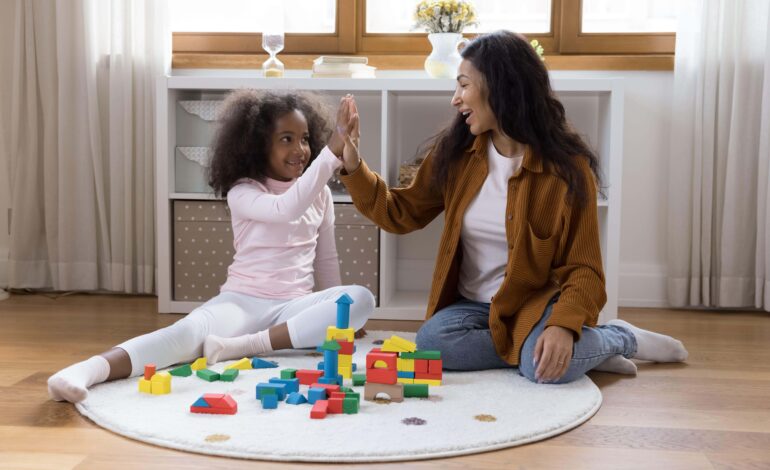
How do we help our children develop the confidence they need to succeed? Empowering young minds and nurturing their self-confidence is a cornerstone of healthy child development. When children believe in themselves, they are more likely to face challenges, learn from their experiences, and ultimately, lead fulfilling lives.
As parents and educators, we want our kids to feel comfortable taking risks and trying new things. We want them to understand that it’s okay to fail sometimes—because that means they’re learning! It’s important for us as parents not only to encourage our children but also model this behavior ourselves by showing them how we cope with failure ourselves. When they see us being brave and taking chances despite setbacks or failures, they’ll know that it’s okay for them too! In this blog, we’ll explore a range of activities designed to foster confidence in children, setting them on a path towards a bright and successful future.
Encourage Creative Expression

Creative outlets are vital for a child’s self-expression and self-esteem. Providing them with the tools and space to explore their creativity, whether through art, music, or writing, allows them to discover their unique talents and capabilities. It also helps them develop important skills like critical thinking and problem solving that will benefit them in the future. A creative approach can be applied to any subject matter and can help children learn more effectively because it requires them to take ownership of the learning process rather than just memorizing facts.
The best way to encourage creative expression is by modeling your own creativity. Let your child see you cooking dinner with fresh ingredients or drawing with colored pencils when you’re stressed out at work—you don’t have to be an artist or musician yourself! You’ll encourage your child to think outside of the box while they’re doing something as simple as eating dinner together or waiting in line at the movies.
Promote Problem Solving
Independent thinking and problem-solving skills are important for everyone, but especially children. Children need to be able to find solutions to their own challenges and figure out how the world works on their own terms, rather than just following instructions from adults. This fosters a sense of autonomy and self-assurance that many people never achieve.
A great way to encourage this kind of thinking is by letting your child take on a challenge, any challenge! Let them figure out how they’re going to solve it, then give them time and space to do it. You may be surprised at what they come up with!
Support Their Interests
Nurturing a child’s interests and passions provides them with a sense of purpose, accomplishment, and confidence. Whether it’s sports, art, or science, investing in their hobbies helps build a strong foundation of confidence.

This is important because children need to feel like they can accomplish things independently. When they have an interest or hobby that they enjoy doing, they will be more likely to try new things as they grow older and continue on their path toward adulthood. The key is finding activities that both you and your children can enjoy together!
Teach Resilience
Resilience is a crucial trait that empowers children to bounce back from setbacks. Encourage them to view failures as learning experiences, emphasizing that mistakes are a natural part of growth. Help kids develop this skill by helping them become more aware of their feelings when they experience failure. Talk about how they felt when they didn’t get a good grade on their test or couldn’t get the ball down in soccer, for example. Then explain how you felt when something similar happened to you and how you dealt with it.
When your child makes a mistake, try not to be too critical or judgmental of him. Instead, acknowledge how hard he worked on his project or how much time he spent practicing soccer before letting him know what needs improvement in order for him to succeed next time around.
Promote Physical Activity
We know it can be tough to get your kids to play outside. After all, they’re always on their phones and iPads, and they’re always begging you to let them watch TV. But there’s something important that happens when we move our bodies: we feel better about ourselves and get into better moods. And that’s why it’s so important that you encourage your kids to get outside, even if it’s just for a little bit each day!
There are tons of ways for your kids to stay active, even when they’re inside. They can dance around in the living room or play tag in their bedrooms. If they have an Xbox or PlayStation game console, they can run around while playing video games—it doesn’t matter if they’re just pretending! And if all else fails? You can always turn on some music and dance with them!
Volunteer or Community Service
Volunteering and community service are important to children’s development. When you volunteer, your child will be exposed to a diverse group of people, and this can help them develop empathy for those who are different from them. It can also give them the sense that they have an impact on the world around them—and that they’re capable of making a difference.
You might even find that volunteering together as a family has some surprising benefits! For example, kids who do volunteer work tend to have higher self-esteem than their peers who don’t volunteer. And research shows that volunteering at school helps students stay engaged in their studies—even when they’re older!
Practice Mindfulness and Self-Care

Mindfulness and self-care are essential to a healthy life. When you’re stressed out, it’s easy to forget the importance of taking care of yourself. But the truth is, if you don’t take care of yourself, then how can you be the best version of yourself for others?
You already know how important it is to practice mindfulness and self-care in your daily life—and now it’s time to start teaching that lesson to your kids too! Here are some simple ways to start: Teach them relaxation techniques like deep breathing or meditation. Encourage healthy habits like exercise, proper nutrition, and adequate sleep. Model these behaviors for them by making time for these activities in your own life!
Provide Constructive Feedback
As a parent, you have a lot on your plate. It can be hard to make sure that the feedback you give your kids is positive, helpful and constructive. But it’s vital that you try!
The most important thing to remember is that kids need to know what they did wrong—but they also need to know how they can improve. When you focus on helping them improve rather than criticizing them, it makes it easier for them to accept your feedback with grace and gratitude. And that’s something they’ll carry with them into adulthood!
That’s it, folks! You’ve got everything you need to help your child become a confident, capable person. Remember to celebrate their achievements and help them be independent—this will help them feel empowered and proud of who they are. And remember that every child is unique: tailor these activities to suit their individual personalities.
RUCHI RATHOR Founder & CEO
Payomatix Technologies Pvt. Ltd.
FOUNDER AND INVESTOR | PAYMENTS PROCESSING EXPERT | MERCHANT ACCOUNT SOLUTIONS | WHITE LABELLED PAYMENT GATEWAY | Dreamer, Creator, Achiever, Constantly Evolving
Website Ruchi Rathor: https://ruchirathor.com
Website Healing Heart https://thehealingheart.me/
Instagram https://www.instagram.com/ruchirathor/
LinkedIn https://www.linkedin.com/in/ruchirathor12/
Facebook https://www.facebook.com/ruchi.rathor.magnificient
Tumblr https://www.tumblr.com/blog/ruchirathor-thehealingheart
Medium https://medium.com/@ruchirathor_23436









